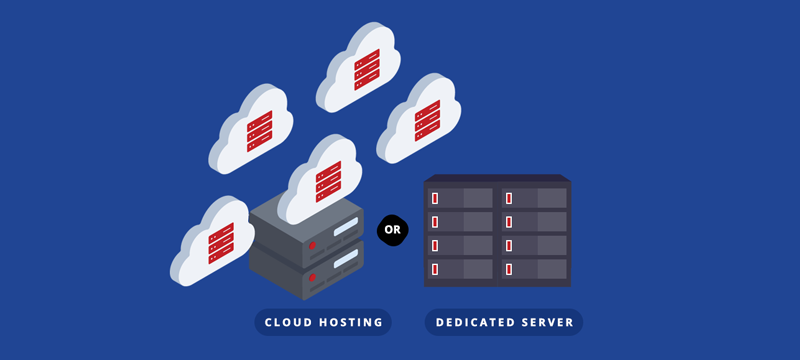Choosing the right hosting option can be an onerous task. Not only have you a range of hosting types to choose from but you’ve also got a plethora of different packages to pick from. To help you make a more informed decision, this post will examine the two types of hosting that most companies have trouble deciding between: cloud hosting and dedicated servers.
The reason businesses have difficulty choosing between these two types of hosting is that they are the two options that offer companies the greatest computing capabilities. Both cloud and dedicated servers can provide enormous storage, exceptional performance and the ability to run any mission critical service or application.
That said, the two hosting solutions are very different in nature. Each has its own pros and cons and the choice you make should be based on the needs of your business.
Common features of cloud hosting and dedicated Servers
Both cloud hosting and dedicated servers provide users with a complete server environment and very similar server administration. They can both be managed with the same tools and run the same services and applications. So, from this perspective, there is little difference between them.
Features of cloud hosting
What makes cloud hosting different is that the platform is virtualised. In other words, the cloud server you use is a virtual machine that runs on a highly powerful physical server. When you choose a public cloud provider, their cloud platform will consist of many physical servers, each hosting a number of virtual ones.
Virtual servers have several benefits over dedicated servers. As they are virtual rather than physical, they can be controlled just like software. This means if you need a new virtual server, one can be created very quickly and you can access additional resources as and when needed. This gives cloud the edge over dedicated servers when it comes to providing clients with an on-demand, self-service infrastructure.
Cloud hosting is also extremely flexible. Scaling up can be done instantly providing businesses with unlimited storage or processing capabilities. So, if you experience spikes in demand or want to process big data, there’s no delay in getting the resources you need and your operations will not suffer as a result.
Cloud Servers can also easily be backed up and moved between data centres. This means, in the event of hardware failure or even an entire data centre failure that your server can continue to operate without downtime. This is why some web hosts are now able to offer 100% uptime guaranteed by SLAs.
From a financial point of view, cloud hosting can work out much cheaper than a dedicated server. As you are using a virtual machine, there is no initial capital expenditure for the hardware set up and the savings here can be substantial. In addition, cloud is paid for on a pay-as-you-go basis, so if you need to scale up for spikes, you only pay the extra resources during the time you need it – there’s no need to move to a more expensive package.
The final benefit of cloud hosting is that it is managed by your service provider. So, the responsibility for updating operating software, security and maintaining the physical hardware comes as part of the service.
Dedicated Server Hosting
Dedicated servers are physical machines and whilst they take longer to set up than cloud servers, all the resources of that dedicated server are at your disposal. In addition, you can configure a dedicated server to the exact specifications you require, i.e. you can select the processor, RAM, operating system and storage most suitable for your business.
In this sense, dedicated servers can be more powerful than cloud servers, offering better compute and IO performance, especially if you are using machines with multiple high-speed processors, SSD hard drives and significant amounts of DDR4 RAM. For capacity purposes, it is also possible to create a cluster of dedicated servers if demand requires it.
From a financial perspective, dedicated servers can be more expensive as payment has to be made for all the resources that are provided. Maintaining redundant failover servers in the event of a disaster can add to these costs, too.
Many businesses use dedicated servers for hosting multiple websites, for websites with high volumes of traffic and for hosting databases and web apps. They are also used by companies who need to meet stringent security and compliance requirements, principally because a cloud network’s hardware is shared by multiple users whereas dedicated servers operate in an isolated environment.
Conclusion
Both cloud hosting and dedicated servers can provide you with the resources you need to run busy websites and online applications. Overall, cloud servers are quicker and cheaper to set up and much quicker when it comes to upgrading RAM, disk space and CPU.
Both can provide high availability environments, but once again, this is quicker and easier to achieve in a cloud environment. Dedicated servers, however, can offer the best performance and help you meet the most stringent of compliance needs.
If you are considering either cloud hosting or dedicated server hosting and require more help in deciding which is best for you, give us a call on 0800 862 0890 and we’ll be happy to advise.


